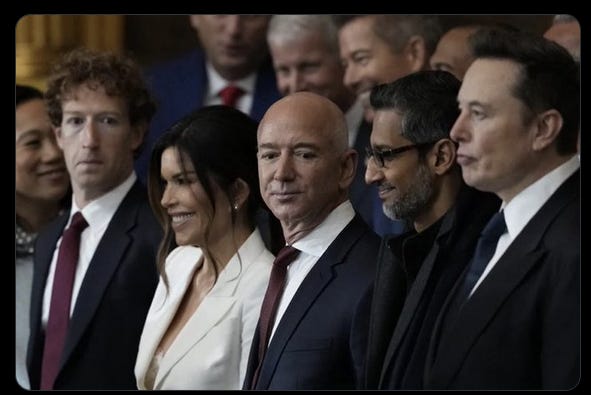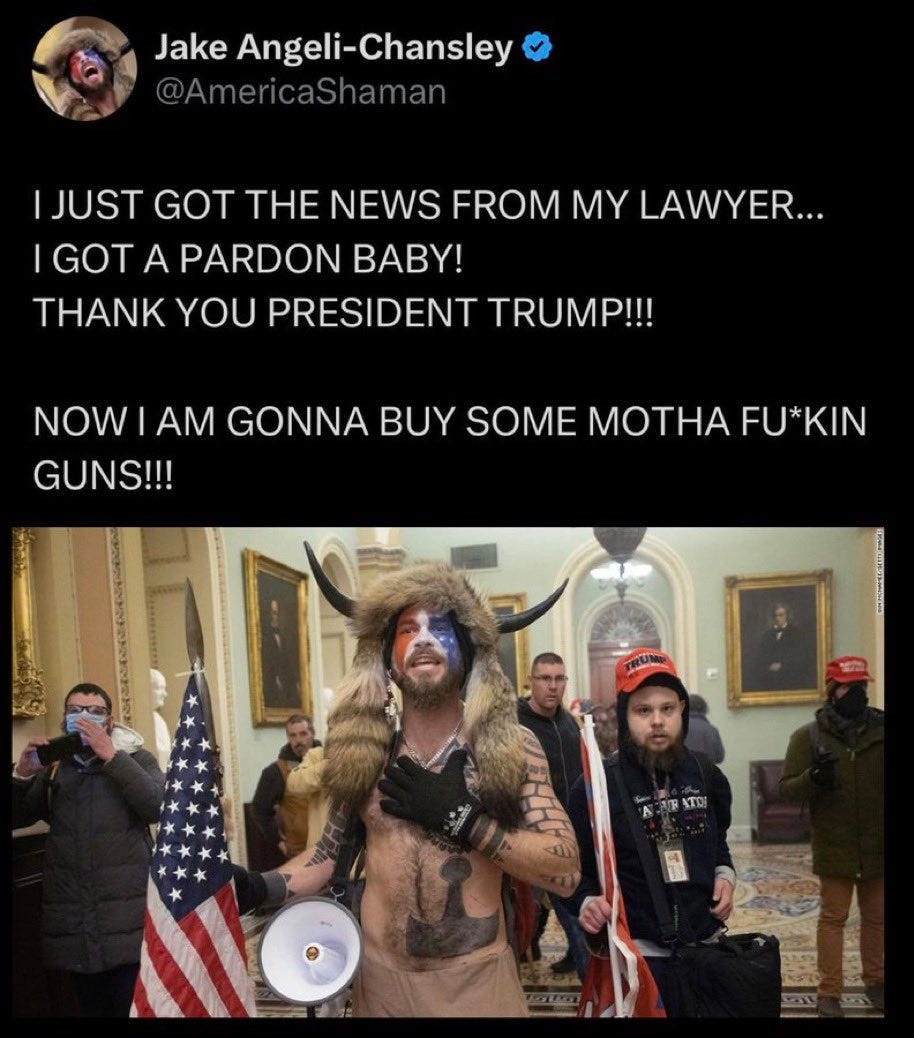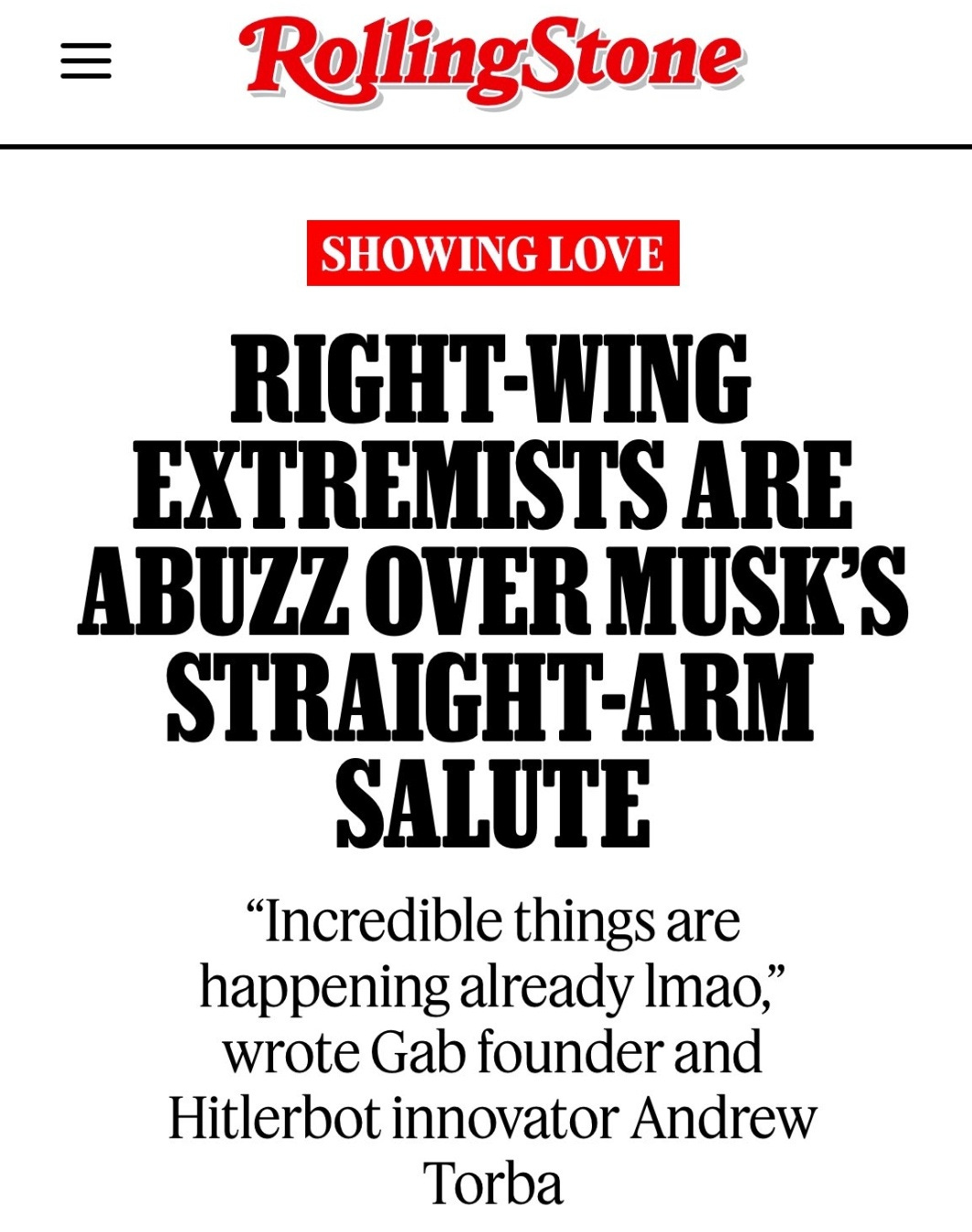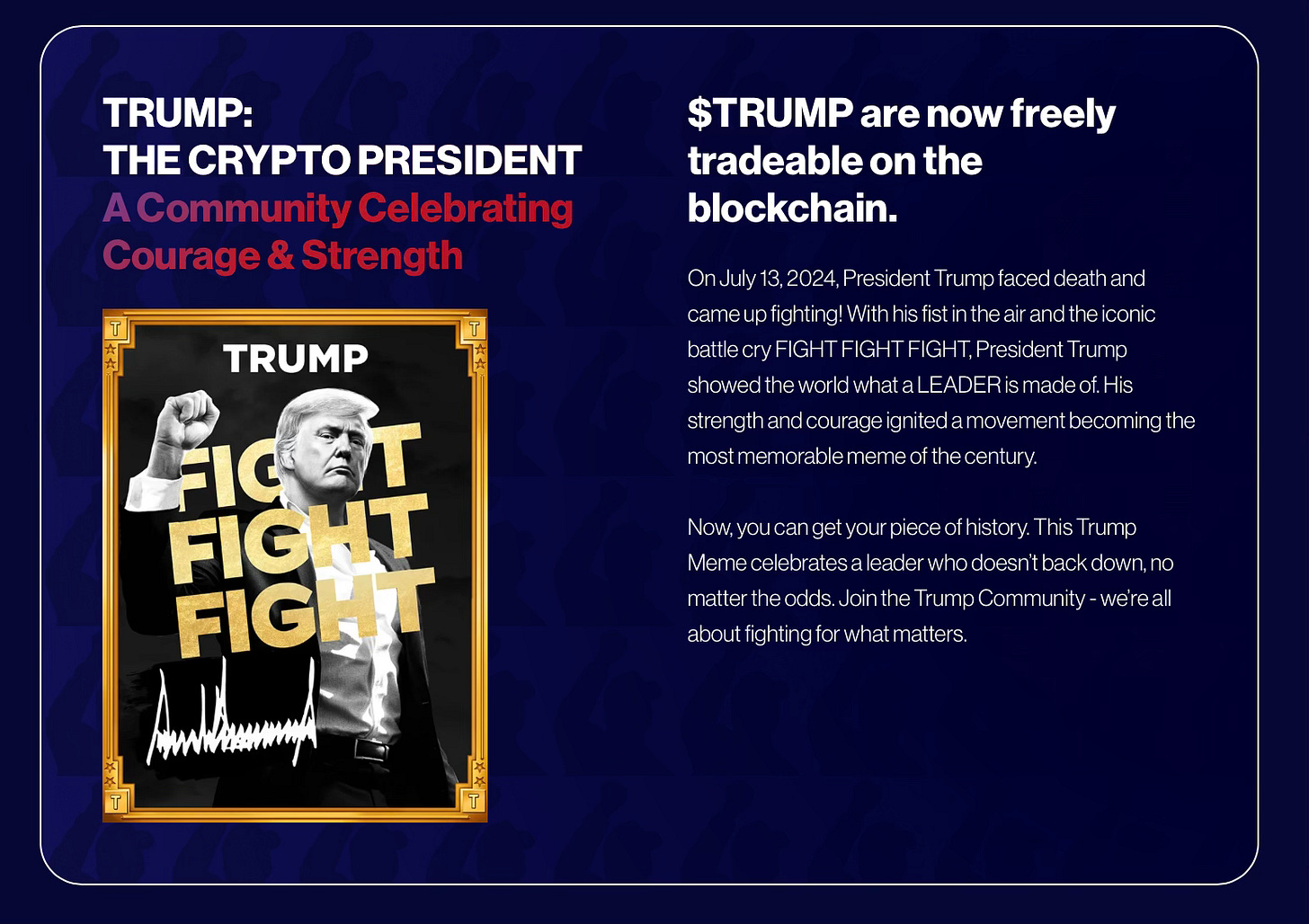Dictator on Day One
I knew it was coming, but it's still shocking to see.
All along, I never completely believed what I was writing. That’s the only conclusion I can draw from the genuine shock I feel as I watch Trump do what I’ve written over and over again he would do. Why am I so genuinely stunned? I suppose some part of me, and a larger part than I understood, wanted very much to believe the people who told me I was nuts to expect this. Because I should not be this shocked. But I am.
We all saw this:
Every single American, and probably the better part of the entire world, witnessed this live at the time, and over and over since. We’ve seen it from hundreds of camera angles. It was a horror, and a disgrace, and now the insurrectionists have been pardoned—the Proud Boys, the Oath Keepers, the “Camp Auschwitz” guy, all of them.
We are now citizens of a country that demands its citizens disbelieve the evidence of our eyes, purge our own memories, pretend we don’t know what we know. It is one thing to have Trump muttering these things in the background; it is another for it to be the official policy of the United States. Such a country is rightly described as an authoritarian dystopia. I knew it was coming and yet I’m shocked witless.
Even JD Vance must be shocked. This was just last week:
Those goons will be Trump’s personal militia. They will terrorize members of Congress who consider defying him, judges whose rulings might displease him, and other “enemies of the people,” including you, if you loudly oppose him. They will show up to protests against Trump’s abuses of power and make them so fraught with menace that ordinary people will fear to join.
It isn’t just them, either. Everyone who wishes to do violence on Trump’s behalf now knows that the president welcomes and rewards it.
Watch this video again:
Among the orders Trump signed yesterday was the directive to the Attorney General to seek the death penalty “regardless of other factors” when the case involves the killing of a law enforcement officer.
He likewise directed the attorney general to seek to overrule Supreme Court precedents that limit the authority of State and Federal governments to impose capital punishment, and to ensure that states have enough lethal injection drugs to carry out executions.
On his first day. It’s a priority for him.
It’s so hallucinatory that I hardly know where to start. Trump’s inability to put his hand on the Limited Edition $69.99 Authentic Lee Greenwood Godblesstheusa.com Trump Tribute Bible. The seating of the purring, satisfied, tech oligarchs in front of the Cabinet. The abolition of the 14th Amendment by executive order.
The North Korean aesthetic:
If that clip were a parody, which regrettably it is not, I would say that the chyron announcing the presentation of the “Inaugural Diet Coke” bottle was excess upon overkill.
Then this, of course:
He did it twice.
“Oh, come on! He was just illustrating what he was saying in the speech—that his heart goes out to people! You’d have to be crazy to think that was what it looks like!”
You’d have to be crazy to think that if, say, Mitt Romney had made that gesture, or Taylor Swift. But this did not happen in a vacuum now, did it? Elon Musk, whose Nazi grandparents moved to South Africa because they admired its racial politics; Elon Musk, who has, since taking over Twitter, transformed it into a Nazi sewer; Elon Musk, who repeatedly finds himself the topic of a 24- hour news cycle because he has whipped up an antisemitic furore on Twitter or proudly promoted a neo-Nazi or agreed that the Jews have it coming; Elon Musk, who has recently thrown his considerable weight behind a neo-Nazi party—in Germany, no less—is no longer entitled to the benefit of the doubt. Remember when Ben Shapiro had to drag Musk on that grim apology tour to Auschwitz? (It didn’t take, I guess.)
That wasn’t “a little bit like” a Nazi salute. That was a 10 out of 10. The facial expression. The grunt. Doing it twice.
But here’s the key point. Any man troubled by the suggestion that he is a Nazi, or partial to Nazis, would wish to avoid giving the impression that he is one. Musk is not unfamiliar with the media. He knew damned well what that would look like. The most charitable interpretation on offer (while remaining in the realm of reality) is that he was just trolling. But who the hell trolls by throwing a Nazi salute before a screaming crowd at the presidential inauguration?
Musk spends his entire day tweeting until his fingers cramp. He’s well aware what’s trending on Twitter. He’s seen the headlines, too. (This story is on the front page of European newspapers, too, by the way—and no one here thought that was just an awkward wave.)1 Musk is well aware that whatever he meant by that gesture, neo-Nazis around the world have concluded with elation that it was just what it looked like:
Any normal man, any decent man who sought to discourage the recrudescence of Nazi ideology, would say: “That looked wrong. I didn’t mean it that way. I do not wish to encourage Nazism.”
But he has not.
I’ve noticed that reporters are citing “Trump confidante Andrea Stoppa,” who wrote, on Twitter: ‘That gesture, which some mistook for a Nazi salute, is simply Elon, who has autism, expressing his feelings by saying, ‘I want to give my heart to you.’”
This is Andrea Stroppa:
I have no idea what his relationship to Musk really is,2 but he claims to be Musk’s spokesman in Italy. But minutes before posting that, he posted this:
If you note that a journalist has quoted Stroppa’s second tweet, but not the first, you would be right to conclude that this journalist is either a fool or taking you for one.
Over the weekend, Trump became one of the 25 richest men on the planet owing to sales of the Trump meme coin. Trump has essentially promised there will be no regulation on these instruments. Not to be outdone, Melania launched her own coin, which instantly achieved a US$5 billion market cap.
Even the pastor who gave the blessing launched a coin:
Irrespective of the risk unregulated instruments like this pose—not just to the suckers who buy them but to the global economy—this is an instrument of unvarnished corruption. But the corruption is already beyond all fathoming. The donations to the inaugural committee. The phony libel suits meant to shake down the television networks. I could go on, but I’ve lost track. It’s obscene. And to my surprise, I’m shocked.

Then there’s TikTok. Trump now thinks the US has “bigger problems” than a massive Chinese spy operation running in the open on American soil. He signed an executive action delaying the enforcement of the TikTok ban by 75 days. (He has no authority to do this.)
“The past was alterable. The past never had been altered. Oceania was at war with Eastasia. Oceania had always been at war with Eastasia.”
Orwell saw this phenomenon up close. He couldn’t otherwise have written those lines. But when you first read them, did you imagine that such a thing could literally happen? Still less, in America? And when you imagined it, did it look like this? I always imagined the Inner Party in Airstrip One as chronically terrified, like Soviets during Great Purge. I never imagined the whole business would be so jolly.
I don’t know why I didn’t imagine that. I’ve certainly read enough descriptions of the surrender to a dictator as an ecstatic release. But it just blows my mind to see how readily Americans have gotten into the swing of it.
This will never look normal to me. I’m too old to change my mind about what America is. But for a younger generation, it will be all they know. They won’t even really believe us when we tell them we once lived in a country where none of this was imaginable.
Trump’s team has asked more than a dozen senior career diplomats to step down. Reportedly, all undersecretary and assistant secretary level officials—the entire two layers of officials under the Secretary of State—were told to go.
The flights of nearly 1,660 Afghans who had been cleared by the US government to resettle in the US have been canceled under Trump’s order suspending US refugee programs. They include family members of active-duty US military personnel, minors awaiting reunification with their families, and Afghans at risk of Taliban retribution because they fought with us. Thousands more who have been approved for resettlement have been left in limbo. Many of them, I’m sure, are families just like the family readers of the Cosmopolitan Globalist have been supporting. The amount of pain this represents is impossible for me to think about. These are human beings.
We withdrew from the World Health Organization, which will cripple efforts to eradicate polio, AIDS, malaria, and tuberculosis. It will hamper the identification of new viral threats. American scientists will lose access to critical genetic databases, which will have a direct effect on their ability to produce vaccines and develop new medications.
We had more than enough power to insist upon reform in the WHO. This is just an act of vandalism. It brings China closer to dominating the international organizations we midwifed into being.
When you couple this with the influence of RFK Jr., it becomes a mathematical certainty that in the coming years, thousands or perhaps millions of Americans will stupidly die of preventable epidemic disease.
Congressman Andy Ogles has introduced a bill giving Trump authority to acquire Greenland. He says, “Frankly, we are the dominant predator.”
I thought Ivanka looked terrific. (Her cosmetic surgeon might be in line to receive the Presidential Medal of Freedom.) Melania now has the face she deserves. That hat was strange and sinister. It was something a woman with an unwholesome interest in Dalmatian puppies might wear.
In other news, Russia would like to rename the Black Sea. Henceforth, they say it should be called the Russian Sea. (Ukraine, Romania, Bulgaria, Turkey, and Georgia have not yet commented.)
In response to European proposals to send peacekeepers Ukraine, Vladimir Solovyov said they should focus on protecting Europe from Russia. Russia, he said, will destroy Britain and conquer Germany and France—where Russian troops will be met with flowers. Germany’s leaders, or those “Nazi dirtbags,” as he calls them, will be “erased off the face of the earth.”
This would all be very amusing were it not for a number of recent warnings that Russia is, indeed, planning to take on NATO. See, for example, this summary of the news from John Schindler:
… Westerners have amused themselves with tales of Russian military incompetence, corruption, and stupidity on display in Ukraine. Most of them are true. Things are so bad that Moscow had to ask North Korea for its troops on the frontline. However, such sagas are familiar to seasoned Russia watchers, historically speaking. Russian soldiery acting as a drunken and undisciplined rabble, killing and raping civilians, requiring their officers to shackle or shoot their own troops to maintain discipline, is a story that reaches back centuries. Yet, that drunken rabble reached Paris in 1814 and Berlin in 1945.
Simply put: Does Putin have aggressive plans beyond Ukraine? There’s mounting evidence that Moscow’s military planning extends beyond the border of the former Soviet Union. Through cash incentives and avoiding conscription in major cities, which risks making the war politically unpopular, Russia has made good its severe manpower losses. Fighting to the last Udmurt and Buryat is a short-term manpower strategy, but it’s worked for the Putin regime so far.
One year ago exactly, Top Secret Umbra shared the warning from NATO leaders that a Russian war against Europe, not just Ukraine, was approaching later this decade. Per my report:
“Perhaps the bluntest warning came last week from Gen. Sir Patrick Sanders, the British Army’s top general, who stated at a conference, while implying that war with Russia was a close as three years away, that the country’s “prewar generation” was unready for the coming conflict, citing the need for a “citizen army.” Since the British military abandoned conscription more than 60 years ago, these comments got noticed. His statement that “a whole-of-nation undertaking” is needed to prepare for war cannot be doubted, while Sanders’ observation, “Ukraine brutally illustrates that regular armies start wars; citizen armies win them,” explains where he thinks NATO is headed, rather soon.
“It’s perhaps easy to dismiss the warnings of generals and defense officials about too-low manpower and budgets. Who ever has asked for less men and money? That said, it’s difficult to fault Sanders, since Britain’s military is unquestionably facing a dual crisis of too few recruits and too little modern gear. The difficult truth that the British armed forces only have enough munitions on hand to fight for a week before they run out is shared by almost all of NATO.”
Over the last 12 months, Russia has only upped its aggression against NATO. Chekist-in-Chief Putin, ever the honey badger with a few thousand nuclear weapons, cares not one whit how upset Western governments become at his increasingly dangerous antics. A few days ago, Polish President Donald Tusk accused Moscow of “planned acts of air terror, not just against Poland but against airlines across the globe.” This amplifies leaks from Western, especially US, intelligence a couple months back that the Kremlin indeed was plotting to blow up Western cargo jets. Three officials from NATO intelligence services told me that such reports were quite real. If Moscow is willing to blow up civilian aircraft—not merely shooting them down by accident, as just happened with Azerbaijan Airlines—there’s not much Putin’s regime will demure from attempting.
Now we have another rather explicit warning of coming Russian aggression issued by a top NATO official. Yesterday, in Welt am Sonntag, Maj. Gen. Christian Freuding, who heads the Ukraine outreach office in Germany’s Ministry of Defense, issued a stark caution: “The Russian Army has more tanks, more ammunition, more missiles, more drones every month. Production is growing, stocks in the depots are growing.” Freuding explained that it was by no means certain that Russia was planning an attack on Europe, “but Moscow is clearly creating the conditions for it,” he added. The report continued that, by recruiting some 30,000 fresh troops monthly, the Russian military had grown to about 1.5 million active troops, its grave losses in Ukraine notwithstanding—nearly ten times the size of Germany’s military. Germany and NATO would be in “serious military danger” by 2028, based on current intelligence assessments of identifiable trends, per the Welt report.
Freuding is a serious person with a doctorate as well as extensive military experience, including a great deal of knowledge about Ukraine and Russia. Two-star generals don’t make such hair-raising statements to the media without authorization, so Berlin is preparing its public for what’s coming. Putin is planning for a wider war against NATO. After all, he and his regime have stated for years that Russia is already at war with NATO, Ukraine is merely the current battlefield. The Kremlin strongman is confident that the West is eager to avoid any war at almost any cost. For decades, arrogantly clueless Western elites have ignored plain statements from Putin and his retinue about how the Kremlin views us and plans to deal with us. Let’s hope that widespread delusion disappears, starting today, because the war clock is ticking.
Yesterday morning, a Russian drone crashed after encroaching on Romanian airspace, prompting NATO to scramble jets.
One bit of unequivocally good news: Emily Damari, Romi Gonen, and Doron Steinbrecher were released, after 471 days in Hamas captivity.
Meanwhile, Joe Biden pardoned his entire family. It is on the one hand awful, because it will immediately be used to legitimate what Trump is doing. But his supporters hardly needed the excuse, and we can be in no doubt now that Trump would have persecuted Biden’s family to the ends of the Earth. He may yet.
I can’t work up a head of steam about it. I’d have done the same in his place, and I’d think less of anyone who wouldn’t. “I hate the idea of causes,” EM Forster wrote, “and if I had to choose between betraying my country and betraying my friend, I hope I should have the guts to betray my country.” If this is true of friends, it is even more true of family. Forster knew everything about the kind of world we’re now entering. Little would be less admirable to me than a man who stands so firmly on principle that he abandons his own family to Trump’s revenge. “Love and loyalty to an individual can run counter to the claims of the State,” writes Forster. “When they do—down with the State, say I, which means that the State would down me.”
The words are from Forster’s Two Cheers for Democracy, which once I read as a moving artifact of another age, but which now seems contemporary. This, for example, might have been written today:
… During the present decade thousands and thousands of innocent people have been killed, robbed, mutilated, insulted, imprisoned. We, the fortunate exceptions, learn of this from the newspapers and from refugees, we realize that it may be our turn next, and we know that all these private miseries may be the prelude to an incalculable catastrophe, in which the whole of western civilization and half oriental civilization may go down. Perhaps history will point to these years as the moment when man’s inventiveness finally outbalanced his moral growth, and toppled him downhill.
The decade being tragic, should not our way of living correspond? How can we justify trivialities and hesitations? Ought we not to rise to the great dramatic conception which we see developing around us? The situation is tremendous; it has never been equalled, because the world has never before been so closely interlocked. The pillars of the twenty-thousand-year-old house are crumbling, the human experiment totters, other forms of life watch. Ought we not, at such a moment, to act as Wagnerian heroes and heroines, who are raised above themselves by the conviction that all is lost or that all can be saved, and stride singing into the flames?
To ask such a question is to answer it.
Or this: “The state of being half frightened and half thinking about something else at the same time is the state of many English people today.” How many of us might also describe our state of mind this way? It is, he says, “a 1939 state.” But it turns out that it’s also a 2025 state:
… This post-Munich world may not last long, but we are living in it now, and we have not any other life. We have to make the best of an unexplored and equivocal state, and we are more likely to succeed if we give up any hope of simplicity. “Prepare, prepare!” docs not do for a slogan. No more does “Business as usual.” Both of them are untrue to the spirit of 1939, the spirit which is half afraid and half thinking about something else.
He notes the peculiar mood when a crisis goes on, and on, and on:
… This decade has lasted long enough, and the Crisis in particular has become a habit, indeed almost a joke. Emotions are no longer deeply stirred by it, and when Germany or Italy destroys an extra country we are upset for a shorter period each time. We are worried rather than frantic.
This is true for us, too, not only abroad but at home. When Trump destroys another democratic norm, we are upset for a shorter period each time, though perhaps it isn't correct to say that we are worried rather than frantic; rather, the franticness comes and goes.
In writing this, he speaks for me—and was clearly looking at the same kind of people:
I have lost all faith in positive militant ideals; they can so seldom be carried out without thousands of human beings getting maimed or imprisoned. “Phrases like “I will purge this nation,” “I will clean up this city,” terrify and disgust me. They might not have mattered when the world was emptier; they are horrifying now, when one nation is mixed up with another, when one city cannot be organically separated from its neighbors.
(Though I wonder if, because I grew up reading Forster and others of his age, it is not so much that he speaks for me as that he created me?) Still, it is eerie to read this and to understand exactly what he means:
… I belong to the fag-end of Victorian liberalism, and can look back to an age whose challenges were moderate in their tone, and the cloud on whose horizon was no bigger than a man’s hand. In many ways it was an admirable age. It practiced benevolence and philanthropy, was humane and intellectually curious, upheld free speech, had little color-prejudice, believed that individuals are and should be different, and entertained a sincere faith in the progress of society. The world was to become better and better, chiefly through the spread of parliamentary institutions. The education I received in those far-off and fantastic days made me soft, and I am very glad it did, for I have seen plenty of hardness since, and I know it does not even pay.
Yes. I belong to an age that was not like this one:
I know what he means, too, when he says his reflections are those of “an individualist and a liberal who has found liberalism crumbling beneath him.”
This is such a difficult moment to live in, one cannot help getting gloomy and also a bit rattled, and perhaps short-sighted. In search of a refuge, we may perhaps turn to hero-worship. But here we shall get no help, in my opinion. Hero-worship is a dangerous vice, and one of the minor merits of a democracy is that it docs not encourage it, or produce that unmanageable type of citizen known as the Great Man. It produces instead different kinds of small men—a much finer achievement. But people who cannot get interested in the variety of life, and cannot make up their own minds, get discontented over this, and they long for a hero to bow down before and to follow blindly. It is significant that a hero is an integral part of the authoritarian stock-in-trade today. An efficiency-regime cannot be run without a few heroes stuck about it to carry off the dullness—much as plums have to be put into a bad pudding to make it palatable. One hero at the top and a smaller one each side of him is a favorite arrangement, and the timid and the bored are comforted by the trinity, and, wing down, feel exalted and strengthened.
No, I distrust Great Men. They produce a desert of uniformity around them and often a pool of blood, too, and I always feel a little man’s pleasure when they come a cropper. …
I take very seriously Forster’s advice about how to live with this. I don’t know if it's good advice, but I find it comforting. Spend money, he suggests. This is a fine thing to do. Spend money on artistic things—it’s a defiant gesture of hope.
And be good to your friends:
I believe in aristocracy, though—if that is the right word, and if a democrat may use it. Not an aristocracy of power, based upon rank and influence, but an aristocracy of the sensitive, the considerate and the plucky. Its members are to be found in all nations and classes, and all through the ages, and there is a secret understanding between them when they meet. They represent the true human tradition, the one permanent victory of our queer race over cruelty and chaos. Thousands of them perish in obscurity, a few are great names. They are sensitive for others as well as for themselves, they are considerate without being fussy, their pluck is not swankiness but the power to endure, and they can take a joke.
I fault Biden for many things. Everything, really. But not for keeping his family out of Trump’s clutches. It is about the only thing he’s done, recently, that I have liked.
So so there we are. No one can say he wasn’t warned—certainly not by me. He promised to be a dictator from Day One. Promises made, promises kept.
Sample:
Musk, I have heard, has a formula for doing business in other countries: He recruits a state envoy as an intermediary and turns the envoy into an influencer on Twitter. Soon enough, the new influencer’s boss begins shoveling government money in Musk’s direction. Stroppa seems to be this kind of figure.
















I think people like you (and me and probably most of Cosmo readers) keep being shocked by the actions coming from Trump and his ilk because, despite them being predictable and announced, they are so alien to our moral frameworks that we can never *emotionally* convince ourselves that someone would actually carry them out.
When reading about history or rationally considering what might happen, there's always a level of disconnect that we can never eliminate, no matter how hard we try, and so we are never truly ready for how it feels seeing it in reality. Call it some fundamental aspect of human psyche (I'd love if an specialist gave their thoughts on this).
>"Yet, that drunken rabble reached Paris in 1814 and Berlin in 1945."
OK, but that was only after the armies of France and Germany, respectively, had had their asses handed to them by the Russian winters.
I spent most of my adult life in elite combat arms branches of the U.S. military, and I've been watching the Ukraine war closely. There is little doubt in my mind that if the U.S. had properly supported Ukraine, Ukraine would have cleaned slate months ago. Everybody wants to quantify war, and so few people really understand the qualitative intangibles, such as distributed command vs centralized command, and what a force multiplier it is. Or Napoleon's observation that the moral is the the physical as 3 is to 1. In the absence of nukes or other WMDs, Russia wouldn't stand a chance going up against a full NATO effort. Not a chance in hell.
As far as Trump goes, in my view this is the culmination of a decades-long effort that probably began with Lewis Powell's 1971 memorandum to the U.S. Chamber of Commerce. We now have the centralization and alignment of the Executive, the Legislative and the Judicial branches, not to mention corporate interests and more. It will definitely be a rough few years, but there's no use whining about it. In many ways the Democrats brought this on themselves. I find solace—and an outlet for my money and energy—in Movement Labs' Contest Every Race effort: https://www.contesteveryrace.com/. That's where I will be spending my time and efforts.